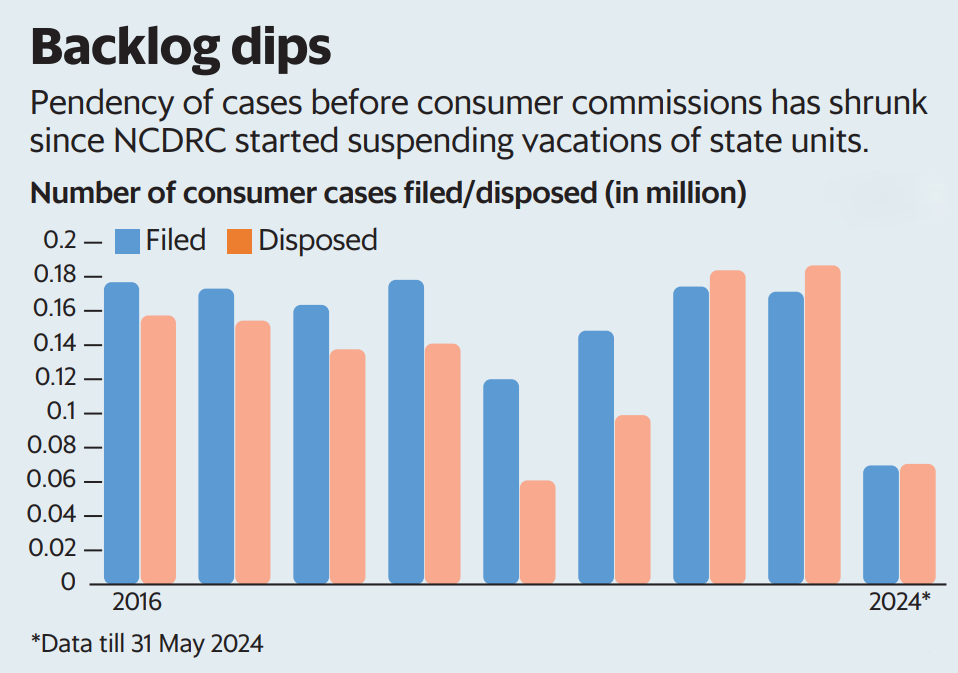CCPA and Pendency of Cases | 03 Jul 2024
Why in News?
Recently, the Central Consumer Protection Authority (CCPA) imposed a penalty of Rs. 3 lakh on an advertisement by an Edtech platform that was found to be "false and misleading" under Section 21 of the Consumer Protection Act.
What is the Central Consumer Protection Authority (CCPA)?
- About:
- CCPA is the regulatory body established under Section 10 of the Consumer Protection Act (CPA), 2019, it regulates matters related to consumer rights violations and unfair trade practices.
- The act empowers the CCPA to prevent false or misleading advertisements and ensure consumer rights are protected.
- It operates under the Ministry of Consumer Affairs, Food and Public Distribution.
- CCPA is the regulatory body established under Section 10 of the Consumer Protection Act (CPA), 2019, it regulates matters related to consumer rights violations and unfair trade practices.
- Section 21 of CPA Act:
- Section 21 of CPA, 2019 grants the CCPA the power to issue directions and penalties against false or misleading advertisements. It provides definition of Misleading Advertisement, Powers of the CCPA and Penalties (imprisonment of up to 2 years and a fine of up to Rs. 10 lakh).
- Benefits to Consumers:
- Informed Consumers: CCPA empowers informed consumer decisions by deterring deceptive marketing.
- Transparent Ads: CCPA interventions promote truthful advertising practices.
- Trustworthy Claims: CCPA discourages misleading claims, boosting consumer trust.
- Fair Competition: It ensures competition based on product merit, not deceptive claims.
Case Study
Reducing Pendency in Consumer Courts through Suspension of Vacations:
- National Consumer Disputes Redressal Commission (NCDRC) and state consumer commissions have worked to clear the backlog of pending cases by suspending the traditional summer vacation practices.
- Background:
-
Since the CCPA's inception (July 2020), 415,104 cases have been filed, and 440,971 cases have been disposed of, indicating a positive trend.
-
However, 555,000 cases are pending before consumer commissions as of December 2022.
-
-
-
Addressing the Backlog:
-
In 2022, the NCDRC started suspending summer vacations for state consumer commissions.
- The NCDRC cited the provisions of the CCPA, which state that all commissions must follow the holiday schedule prescribed by the state government, and there is no provision for a summer vacation in any state office.
-
- Impact and Outcomes:
-
In 2022, the NCDRC received 3,420 cases and resolved 4,138 cases, compared to 2,449 cases received and 2,011 cases resolved in 2021.
- In 2023, the NCDRC received 5,276 cases and resolved 6,422 cases, further reducing the backlog.
- As of May 2024, consumer commissions have resolved 70,576 cases, while 69,615 cases have been filed, indicating a positive trend in clearing the backlog.
- The introduction of e-courts has also contributed to the increased efficiency of the consumer dispute redressal process.
-
Note:
- Consumer forums are categorised into District, State, and National levels. According to the Consumer Protection Act, 2019, complaints can be filed based on the value of the claim.
- District Consumer Disputes Redressal Commission (DCDRC) for claims up to Rs 50 lakh.
- State Consumer Disputes Redressal Commission (SCDRC) for claims between Rs 50 lakh and Rs 2 crore
- National Consumer Disputes Redressal Commission (NCDRC) for claims above Rs 2 crore.
What are the Initiatives for Consumer Protection?
UPSC Civil Services Examination Previous Year Question
Prelims
Q.1 With reference to ‘consumers’ rights/privileges under the provisions of law in India, which of the following statements is/are correct ? (2012)
- Consumers are empowered to take samples for food testing.
- When a consumer files a complaint in any consumer forum, no fee is required to be paid.
- In case of death of consumer, his/her legal heir can file a complaint in the consumer forum on his/ her behalf.
Select the correct answer using the codes given below:
(a) 1 only
(b) 2 and 3 only
(c) 1 and 3 only
(d) 1, 2 and 3
Ans: c

